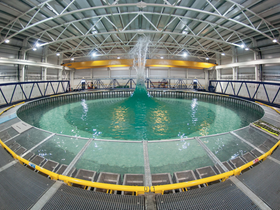event services in Edinburgh
Interview with Encarni Medina-Lopez, University of Edinburgh

Encarni Medina-Lopez is a Doctor in Energy Systems & Dynamics of Biogeochemical Flows at the University of Edinburgh. Encarni is a key player in Edinburgh’s renewable energy sector and is dedicated to Marine Energy; primarily focusing on marine renewable energy and wave energy performance, amongst others. She discusses Edinburgh’s Renewable Energy sector and the vast expertise of the University of Edinburgh’s leading research and renowned Renewable Energy courses.
The University offers a range of renewable energy courses attracting students from across the globe, such as the MSc Sustainable Energy Systems programme. What makes the University of Edinburgh such a popular choice for those who strive to work in the Renewable Energy sector?
The University of Edinburgh is a world-renowned institution in Renewable Energy. For example, for a number of years now, the MSc programme in Sustainable Energy Systems is a highly successful programme in the School of Engineering with 66 students from 24 countries in the current year. This programme is accredited by the Energy Institute, counting towards Further Learning in the attainment of Chartered Engineer status. The industry involvement is also a key player through an Industry Advisory Board, and some of the dissertation projects are proposed by industry partners.
In my case, what took me to Edinburgh was their expertise in Marine Energy. The University of Edinburgh has a doctoral programme focused in Energy Systems, and I was particularly interested in it because of its international reputation. More than 70 students are taking part in the PhD programme in Energy Systems along different stages of the doctorate. These students develop front-line research in energy systems, mostly focused in renewables.
FloWave is the result of cutting edge academic research into wave and tidal current interactions, what is FloWave and what are its sector advantages?
The FloWave Ocean Energy Research Facility is the only circular combined wave and current test facility in the world. It is capable of recreating the complexity of ocean waves and tides at small scale in a controlled environment. The unique circular nature of the tank removes any directional bias, and allows complex multi-directional wave conditions to be created, that are more representative of the real sea. This facility plays a key role in ocean energy research: scale model testing is very important in the development of marine renewable energy devices, which aim to produce clean renewable electricity from the power of the oceans. Increasing the realism and complexity of the test conditions, and making use of the advanced capabilities at FloWave, can further increase learning about device behaviour and performance in a controlled, repeatable, and low-cost environment. FloWave is also used for more fundamental academic research into waves, currents, and their combined effect.
What pioneering research has come out of the University of Edinburgh in recent years?
The University of Edinburgh is a key player in the Engineering and Physical Sciences Research Council (EPSRC) Supergen Offshore Renewable Energy Hub. Supergen Marine has, since October 2003, been undertaking innovative research in support of the developing marine renewables industry. The aim of Supergen is directed towards increasing understanding of the device-sea interactions of energy converters from model-scale in the laboratory to full size in the open sea.
Moreover, the Institute for Energy Systems has led key projects for the ocean renewables sector, producing pioneering research, such as DTOcean, a suite of tools to optimise wave and tidal energy arrays. We are also participating in a number of European projects that are focused on enhancing ocean energy, placing the University of Edinburgh in the core of cutting-edge research in this sector. These projects count on several industrial and academic partners. For example, we are collaborators in the EnFAIT project (Enabling Future Arrays in Tidal) led by the Scots tidal energy developer Nova Innovation, which is aiming at reducing the cost of tidal energy by 40% in 5 years. We are also participating in the development of several wave energy projects taking part in the Wave Energy Scotland stage gate process. Moreover, we are working on projects based on knowledge sharing and collaboration in the renewable energy sector, such as the European Technology and Innovation Platform for Ocean Energy (ETIP Ocean), which has delivered webinars and educational materials, communicating the benefits and challenges associated with renewable energy to industry, academia and the general public
Edinburgh is a Renewable Energy hub – what do you think are the city’s main strengths in the renewables sector?
Edinburgh has both academic and industrial strengths in the renewables sector. The University of Edinburgh produces leading research in the topic of wave and tidal energy, including state-of-the-art test facilities. Key renewable energy developers like Nova Innovation, Atlantis Resources, or Scotrenewables Tidal Power are also based in Edinburgh, leading to strong synergistic interactions between these companies and the University of Edinburgh. Edinburgh is also a popular place for renewable energy conferences. This year, the city hosted the Oceanera-net conference in January, and will host the Ocean Energy Europe (OEE) conference in October. Finally, Edinburgh is in close proximity to the water, and to different port facilities, which makes the city a potential “hotspot” for offshore renewables deployment.
In my personal experience, the research atmosphere in Edinburgh made me come to develop my interests in renewables, and the ocean energy industrial and academic hub made me stay!

